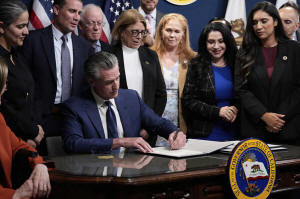California Gov. Newsom signs legislation calling special election on
redrawn congressional map
[August 22, 2025]
By SOPHIE AUSTIN, TRÂN NGUYỄN and NICHOLAS RICCARDI
SACRAMENTO, Calif (AP) — California voters will decide in November
whether to approve a redrawn congressional map designed to help
Democrats win five more U.S. House seats next year, after Texas
Republicans advanced their own redrawn map to pad their House majority
by the same number of seats at President Donald Trump’s urging.
California lawmakers voted mostly along party lines Thursday to approve
legislation calling for the special election. Democratic Gov. Gavin
Newsom, who has led the campaign in favor of the map, then quickly
signed it — the latest step in a tit-for-tat gerrymandering battle.
“This is not something six weeks ago that I ever imagined that I’d be
doing,” Newsom said at a press conference, pledging a campaign for the
measure that would reach out to Democrats, Republicans and independent
voters. “This is a reaction to an assault on our democracy in Texas.”
Republicans, who have filed a lawsuit and called for a federal
investigation into the plan, promised to fight the measure at the ballot
box as well.
California Assemblyman James Gallagher, the Republican minority leader,
said Trump was “wrong” to push for new Republican seats elsewhere,
contending the president was just responding to Democratic
gerrymandering in other states. But he warned that Newsom’s approach,
which the governor has dubbed “fight fire with fire,” was dangerous.
“You move forward fighting fire with fire and what happens?” Gallagher
asked. “You burn it all down.”

Texas' redrawn maps still need a final vote in the Republican-controlled
state Senate, which advanced the plan out of a committee Thursday but
did not bring the measure to the floor. The Senate was scheduled to meet
again Friday.
After that, Republican Gov. Greg Abbott's signature will be all that is
needed to make the map official. It’s part of Trump’s effort to stave
off an expected loss of the GOP’s majority in the U.S. House in the 2026
midterm elections.
A battle for the US House control waged via redistricting
On a national level, the partisan makeup of existing districts puts
Democrats within three seats of a majority. The incumbent president’s
party usually loses congressional seats in the midterms.
The president has pushed other Republican-controlled states including
Indiana and Missouri to also revise their maps to add more winnable GOP
seats. Ohio Republicans were also already scheduled to revise their maps
to make them more partisan.
Redistricting typically occurs once a decade, immediately after a
census. While some states have their own limitations, there is no
national impediment to a state trying to redraw districts in the middle
of the decade.
The U.S. Supreme Court has also said the Constitution does not outlaw
partisan gerrymandering, only using race to redraw district lines. Texas
Republicans embraced that when their House of Representatives passed its
revision Wednesday.
"The underlying goal of this plan is straight forward: improve
Republican political performance,” state Rep. Todd Hunter, the
Republican who wrote the bill revising Texas’ maps, said.
On Thursday, California Democrats noted Hunter’s comments and said they
had to take extreme steps to counter the Republican move. “What do we
do, just sit back and do nothing? Or do we fight back?” Democratic state
Sen. Lena Gonzalez said. “This is how we fight back and protect our
democracy.”
[to top of second column]
|

California Gov. Gavin Newsom signs legislation calling for a special
election on a redrawn congressional map on Thursday, Aug. 21, 2025,
in Sacramento, Calif. (AP Photo/Godofredo A. Vásquez)

Democrats have sought a national commission for redistricting
Republicans and some Democrats championed the 2008 ballot measure
that established California’s nonpartisan redistricting commission,
along with the 2010 one that extended its role to drawing
congressional maps.
Democrats have sought a national commission that would draw lines
for all states but have been unable to pass legislation creating
that system.
Trump’s midterm redistricting ploy has shifted Democrats.
That was clear in California, where Newsom was one of the members of
his party who backed the initial redistricting commission ballot
measures, and where Assemblyman Joshua Lowenthal, whose father, Rep.
Alan Lowenthal, was another Democratic champion of a nonpartisan
commission, presided over the state Assembly’s passage of the
redistricting package.
Newsom on Thursday contended his state was still setting a model.
“We’ll be the first state in U.S. history, in the most democratic
way, to submit to the people of our state the ability to determine
their own maps,” Newsom said before signing the legislation.
Former President Barack Obama, who’s also backed a nationwide
nonpartisan approach, has also backed Newsom’s bid to redraw the
California map, saying it was a necessary step to stave off the
GOP’s Texas move.
“I think that approach is a smart, measured approach,” Obama said
Tuesday during a fundraiser for the Democratic Party’s main
redistricting arm, noting that California voters will still have the
final say on the map.
California's plan is temporary
The measure would have the California map last only through 2030,
after which the state’s commission would draw the next decade’s map.
Democrats are also mulling reopening Maryland’s and New York’s maps
for mid-decade redraws.
However, more Democratic-run states have commission systems like
California’s or other redistricting limits than Republican ones do,
leaving the GOP with a freer hand to swiftly redraw maps. New York,
for example, can’t draw new maps until 2028, and even then, only
with voter approval.

In Texas, outnumbered Democrats turned to unusual steps to try to
delay passage, leaving the state to delay a vote by 15 days. Upon
their return, they were assigned round-the-clock police monitoring.
California Republicans didn’t take such dramatic steps but
complained bitterly about Democrats muscling the package through the
Statehouse and harming what GOP State Sen. Tony Strickland called
the state’s “gold-standard” nonpartisan approach.
“What you’re striving for is predetermined elections,” Strickland
said. “You’re taking the voice away from Californians.”
All contents © copyright 2025 Associated Press. All rights reserved |